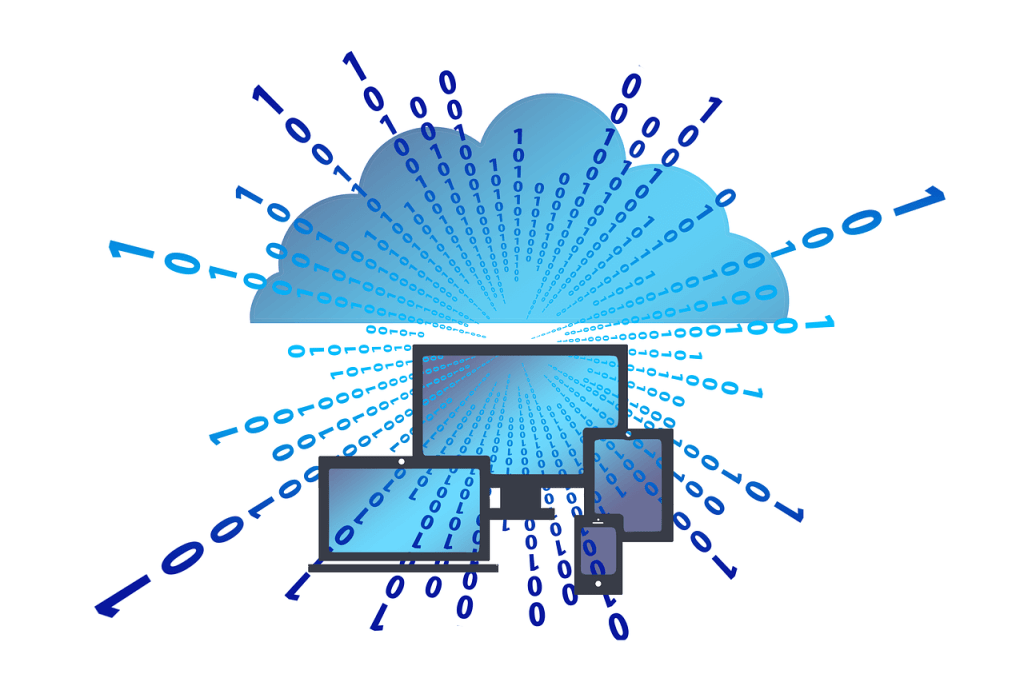As an Amazon Associate I earn commissions for purchases made thru links in this post

IIntroduction to Cloud Gaming
Cloud gaming, also known as gaming on demand, represents a transformative shift in the gaming industry. This innovative approach allows users to stream video games directly to their devices, circumventing the need for high-end, expensive gaming hardware. Instead of relying on powerful local machines, cloud gaming leverages remote servers to deliver gaming experiences via internet connectivity.
The core technology behind cloud gaming involves powerful servers located in data centers, where the games are processed and rendered. These servers then stream the game footage to the player’s device, whether it be a smartphone, tablet, or low-end computer. Users send control inputs back to the servers, creating a seamless interactive experience. This setup ensures that players can enjoy resource-intensive games without the burden of upgrading their personal hardware.
Several notable services have emerged as frontrunners in the cloud gaming arena. Google Stadia, for instance, offers gamers the ability to play AAA titles at high resolutions and frame rates, provided they have a robust internet connection. Similarly, NVIDIA GeForce Now enables users to stream their personal game library from platforms like Steam, Epic Games, and more. Microsoft xCloud, integrated with Xbox Game Pass, grants subscribers access to a vast library of games playable on multiple devices.
In essence, cloud gaming democratizes access to high-quality gaming experiences, making it possible for a broader audience to engage with cutting-edge titles without the financial and technical barriers traditionally associated with gaming. As internet infrastructure continues to improve worldwide, the potential for cloud gaming to grow and evolve remains substantial, promising a more inclusive future for gamers everywhere.
Benefits of Cloud Gaming for Gamers
Cloud gaming offers a myriad of advantages to gamers, fundamentally transforming the way games are accessed and played. One of the most significant benefits is the potential for substantial cost savings. Traditional gaming often requires expensive hardware, such as high-end consoles or gaming PCs, which can be a barrier for many players. With cloud gaming, these costs are mitigated as games are processed on powerful remote servers, allowing gamers to play the latest titles on less sophisticated devices, such as laptops, tablets, or even smartphones.
Another notable advantage is the ability to play games on multiple devices. Cloud gaming platforms enable gamers to seamlessly transition between different devices without losing progress. This flexibility is particularly beneficial in today’s multi-device world, allowing players to enjoy their favorite games whether they are at home, commuting, or traveling. The cross-platform compatibility ensures that gaming is no longer confined to a single piece of hardware, making it more accessible and convenient.
Instant access to a large library of games is yet another compelling benefit. Traditional gaming often involves purchasing individual titles, which can be both time-consuming and costly. Cloud gaming services typically offer extensive libraries of games available through subscription models, giving gamers access to a vast array of titles for a monthly fee. This allows players to explore and enjoy a wider variety of games without the need for significant financial investment.
Moreover, cloud gaming enhances the overall gaming experience by eliminating long download times and providing seamless updates. Instead of waiting hours for a game to download and install, players can start gaming almost instantly. Updates and patches are managed on the server side, ensuring that players always have access to the latest versions without the need for manual downloads or installations. This not only saves time but also reduces the frustration associated with traditional game updates.
Overall, the benefits of cloud gaming for gamers are substantial, offering cost savings, flexibility, instant access to a diverse library of games, and a streamlined gaming experience. As the technology continues to evolve, these advantages are likely to expand, further enhancing the way games are enjoyed by players around the world.

Technical Advantages of Cloud Gaming
Cloud gaming offers a plethora of technical advantages that are transforming the gaming landscape. One of the most significant benefits is the reduction of latency through advanced server infrastructure. Cloud gaming platforms utilize strategically positioned data centers with powerful servers to minimize the distance data needs to travel, thereby reducing latency. This results in smoother and more responsive gameplay, which is crucial for an immersive gaming experience. Moreover, these data centers are equipped with high-speed internet connections and optimized routing, further enhancing the overall performance.
Another major advantage is the use of powerful remote servers to deliver high-quality graphics and performance. Traditional gaming relies heavily on the local hardware’s capabilities, such as the graphics card and processor. However, cloud gaming shifts this burden to remote servers that can handle demanding tasks, including rendering complex graphics and running intensive computations. This allows gamers to enjoy visually stunning games without needing the latest or most expensive local hardware. Essentially, cloud gaming democratizes access to high-quality gaming experiences, making it accessible to a broader audience.
Cloud gaming also provides a consistent gaming experience regardless of the user’s local hardware capabilities. Since the games are processed and rendered on remote servers, the end-user only needs a stable internet connection and a compatible device to stream the game. This eliminates the need for frequent hardware upgrades and reduces the stress associated with maintaining up-to-date gaming systems. Additionally, cloud gaming platforms often offer scalable solutions, allowing them to adjust performance based on the user’s internet speed and device capabilities, ensuring an optimal gaming experience at all times.
In summary, the technical benefits of cloud gaming, such as reduced latency, powerful remote servers, and consistent performance, are making it an increasingly attractive option for gamers. By leveraging advanced server infrastructure and cutting-edge technology, cloud gaming platforms are set to redefine the future of gaming.
Challenges and Limitations of Cloud Gaming
Despite the numerous advantages that cloud gaming offers, several challenges and limitations persist. One of the most significant hurdles is the requirement for a stable and high-speed internet connection. Cloud gaming relies heavily on internet bandwidth, and fluctuations in speed can lead to a suboptimal gaming experience, characterized by buffering and lag. For users in regions with limited internet infrastructure, this can be a barrier to entry.
Latency issues also pose a considerable challenge. In cloud gaming, every action taken by the player must be sent to a remote server, processed, and then the result returned to the user’s device. This round-trip communication can introduce delays, especially when playing fast-paced games where split-second decisions are crucial. High latency can disrupt gameplay fluidity, causing frustration among gamers.
Data privacy concerns are another critical aspect that cannot be overlooked. As cloud gaming involves transmitting data over the internet, there is an inherent risk of data breaches and unauthorized access. Gamers frequently provide personal information, including payment details, which need to be securely handled by cloud gaming providers. Ensuring robust data protection measures is essential to maintaining user trust.
However, advancements in technology and infrastructure are gradually mitigating these challenges. The rollout of 5G networks promises to deliver higher internet speeds and lower latency, significantly enhancing cloud gaming experiences. Moreover, improvements in data encryption and cybersecurity protocols are bolstering data privacy, reassuring users about the safety of their information.
Although these challenges remain, the ongoing technological progress and investments in infrastructure are paving the way for a more seamless and secure cloud gaming future. As these issues are addressed, the widespread adoption of cloud gaming is likely to accelerate, offering an even more compelling proposition for gamers and companies alike.
Cloud Computing Savings for Companies
Cloud computing offers substantial cost savings for companies by reducing the need for significant investments in physical hardware. Traditionally, businesses have had to allocate large portions of their budgets to acquire, maintain, and upgrade on-premises servers and data centers. This capital expenditure (CapEx) model often leads to high upfront costs and long-term financial commitments. In contrast, cloud computing transforms these expenses into operational expenditures (OpEx), allowing companies to pay for only the resources they actually use.
One of the key financial benefits of cloud computing is the ability to scale resources dynamically based on demand. During peak times, businesses can quickly increase their computing power without the need for additional physical infrastructure. Conversely, during slower periods, they can scale down, ensuring they are not paying for unused capacity. This elasticity not only optimizes resource utilization but also contributes to significant cost savings.
Moreover, cloud computing eliminates the need for companies to invest in and manage their own data centers, which involves substantial costs related to real estate, electricity, cooling, and maintenance. By leveraging cloud services, businesses can shift these responsibilities to cloud providers, who offer economies of scale and more efficient operations. This shift not only reduces direct costs but also minimizes the indirect costs associated with managing IT infrastructure, such as hiring specialized personnel and dealing with hardware failures.
In addition, cloud computing enables companies to benefit from the latest technologies without the need for continuous hardware upgrades. Cloud providers regularly update their infrastructure, ensuring that clients always have access to cutting-edge technology. This reduces the financial burden of technology obsolescence and allows businesses to stay competitive in a rapidly evolving market.
Overall, the adoption of cloud computing provides companies with a flexible, cost-effective way to manage their IT resources. By transitioning from a CapEx to an OpEx model, businesses can achieve significant financial savings while also gaining the ability to scale resources efficiently and reduce the stress associated with managing physical hardware.
Operational Efficiency and Flexibility
Cloud computing has fundamentally transformed the way businesses operate, presenting numerous opportunities for enhancing operational efficiency and flexibility. One of the most significant benefits is the improved collaboration among teams. Cloud platforms provide a centralized repository for data and applications, allowing employees to access and share information seamlessly, irrespective of their physical location. This fosters a collaborative environment where team members can work together in real-time, increasing productivity and reducing the time required to complete projects.
Another key advantage is the facilitation of remote work. Cloud solutions enable employees to access necessary tools and resources from anywhere with an internet connection. This capability has become particularly crucial in recent times, as remote work has shifted from a perk to a necessity. By supporting remote work, companies can maintain business continuity, reduce overhead costs associated with physical office spaces, and attract top talent by offering flexible working arrangements.
Moreover, cloud computing enhances the deployment speed of applications and services. Traditional IT infrastructure often requires significant time and resources to set up and maintain. In contrast, cloud platforms allow businesses to deploy new applications and updates swiftly, reducing downtime and ensuring that the latest features and security updates are available to users without delay. This rapid deployment capability allows companies to stay competitive and respond promptly to market demands.
The flexibility provided by cloud solutions extends to innovation and adaptation. Businesses can scale their IT resources up or down based on current needs without the financial burden of investing in physical hardware. This scalability ensures that companies can handle varying workloads efficiently, supporting periods of growth or contraction. Additionally, cloud computing encourages experimentation and innovation by providing a cost-effective environment for testing new ideas and technologies.
In summary, the operational efficiencies and flexibility offered by cloud computing empower businesses to enhance collaboration, support remote work, accelerate deployment times, and adapt quickly to market changes. These advantages underscore the importance of cloud solutions in today’s dynamic business landscape.
Reduced Stress and Improved Focus on Core Business
Cloud computing offers significant benefits for IT teams, primarily by alleviating the burden of routine maintenance and infrastructure management. Instead of dedicating resources to the upkeep of servers, updates, and troubleshooting, these responsibilities are assumed by cloud service providers. This shift not only reduces stress for IT staff but also translates into greater efficiency and stability for companies.
By offloading IT infrastructure management to cloud providers, businesses can redirect their focus to core activities and strategic initiatives. IT teams, freed from the constant pressure of maintaining physical hardware and software, can concentrate on developing innovative solutions and improving existing systems. This enhanced focus on core business activities fosters a more dynamic and productive environment, allowing companies to stay competitive in their respective markets.
Moreover, the scalability and flexibility of cloud computing mean that businesses can adapt more swiftly to changing demands without the stress of overhauling their existing IT infrastructure. Companies can easily scale their operations, whether expanding or reducing resources, in response to market trends. This adaptability is particularly crucial in today’s rapidly evolving business landscape.
In addition to operational benefits, cloud computing also promotes a healthier work-life balance for IT professionals. With fewer emergencies and reduced on-call requirements, IT staff can enjoy a more predictable and manageable workload. This improvement in work conditions can lead to higher job satisfaction and retention rates, ultimately benefiting the company as a whole.
Overall, cloud computing not only reduces the stress associated with IT management but also empowers businesses to concentrate on their primary goals and strategic objectives. By leveraging the advantages of cloud services, companies can enhance their efficiency, agility, and employee satisfaction, paving the way for sustained growth and success.
Future Trends in Cloud Gaming and Cloud Computing
As we look towards the future, the landscape of cloud gaming and cloud computing is set to undergo significant transformations. One of the most influential advancements poised to enhance the cloud gaming experience is the advent of 5G technology. With its promise of ultra-low latency and high-speed connectivity, 5G will enable more seamless and responsive gaming experiences, allowing players to enjoy high-definition, lag-free gameplay on any device, anywhere in the world. This technological leap will not only benefit gamers but also create new opportunities for developers to innovate and expand the boundaries of what’s possible in gaming.
Another key trend set to revolutionize both cloud gaming and cloud computing is edge computing. By processing data closer to the source, edge computing reduces latency and bandwidth usage, resulting in faster and more efficient data handling. This is particularly crucial for cloud gaming, where real-time data processing is essential for a smooth user experience. For businesses, edge computing can lead to more responsive and reliable cloud services, facilitating real-time analytics, improved operational efficiency, and enhanced user experiences.
Artificial Intelligence (AI) integration is also expected to play a pivotal role in the future of cloud technologies. In cloud gaming, AI can enhance game development through procedural content generation, smarter non-player characters (NPCs), and personalized gaming experiences tailored to individual preferences and behaviors. For cloud computing, AI-driven solutions can optimize resource management, predict system failures, and automate routine tasks, thereby driving operational efficiencies and reducing costs for companies.
The convergence of these emerging technologies—5G, edge computing, and AI—will undoubtedly drive the next wave of innovation in cloud gaming and cloud computing. As network technology continues to evolve, the potential for enhanced user experiences and operational efficiencies will expand, offering exciting possibilities for both gamers and businesses alike. The future of cloud technologies holds the promise of a more interconnected, intelligent, and responsive digital ecosystem that stands to benefit all stakeholders involved.
